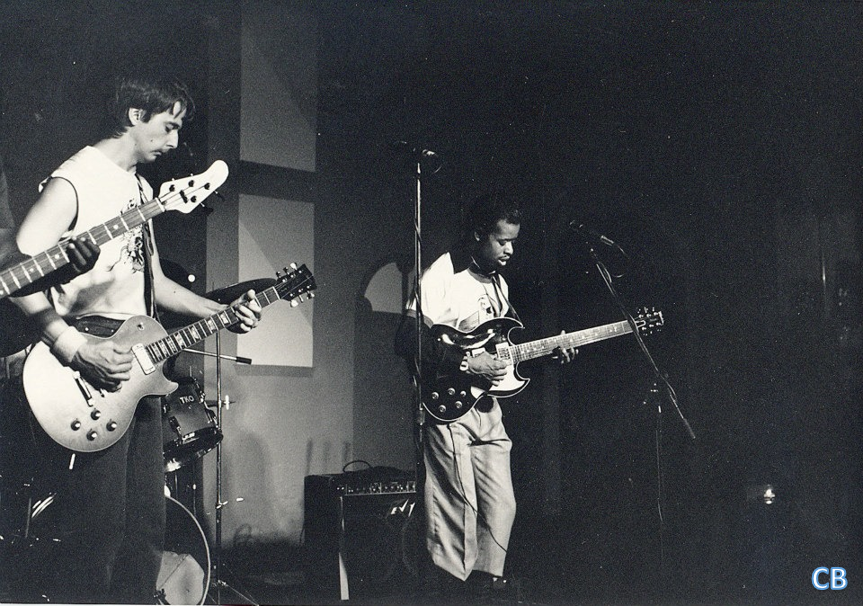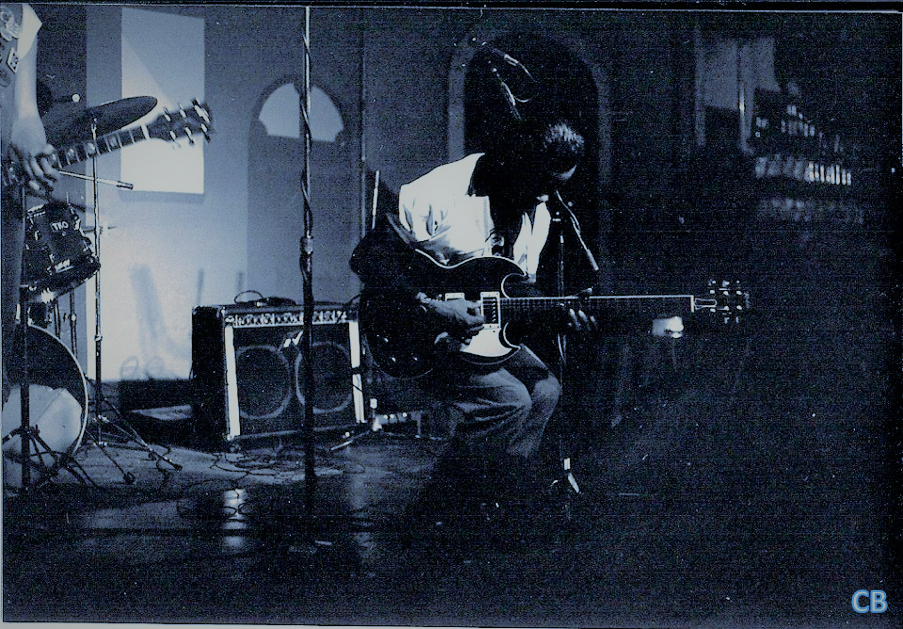Recommended Blues Recording
Lil’ Ed And The Blues Imperials – A Blues Slide Master Emerging, Growing, and Carrying-On the Chicago Blues Heritage
Lil’ Ed And The Blues Imperials – Chicken, Gravy & Biscuits – Alligator Records ALCD 4722
Back in 1986, Mishawaka, IN was abuzz with the news that the Center Street Blues Café was going to open in a century-old brewery building just west of downtown directly off the major east-west artery through the city. The greater South Bend-Mishawaka, IN area has always been a hotbed for blues, primarily due to the close proximity to Chicago. With Chicago only being 90 miles west of the South Bend-Mishawaka, IN area, through the years, the blues had been a constant presence in the locale. Many of the greats of the blues have played in the area, with true blues fans in the area fondly recalling the shows were at Notre Dame’s Washington Hall during the Midwest Blues Festivals, or at other blues shows the university presented at Stephen Center. Blues giants such as Albert Collins, Jimmy Rogers, Martin, Bogan, and Armstrong, John Lee Hooker, Sonny Rhodes, and Left Hand Frank played the renowned Midwest Blues Festivals, among others. Other shows at the university included those by Hound Dog Taylor, Big Walter Horton and Carey Bell, and Eddie Taylor, among others.
On South Bend’s west side on Western Ave, Ribs “n” Blues, a club in a fairly non-descript corner building regularly hosted blues, with Eddie Taylor’s appearance there being particularly memorable.
And of course, the vaunted downtown South Bend club, the original Vegetable Buddies, with its brief 1976-1980 run, hosted some of the most unforgettable blues performances in the north central Indiana area. Blues artists including Taj Mahal, Big Walter Horton, Harvey Mandel, Koko Taylor, John Lee Hooker (a show I have a recording of made directly from the sound board), Albert King, J.B. Hutto and the Hawks, Muddy Waters, Dr. John, Willie Dixon, John Mayall, Luther Allison, Son Seals, Junior Walker and the Allstars, Bogan and Armstrong, Corky Siegel, and Sonny Terry and Brownie McGhee, among others, played the establishment over the years.
In Mishawaka, The Music Box Theater, on the city’s near north side, regularly presented blues, with Luther Allison having provided some notable shows there.
Bluesmen and noted musicians including Albert King, Junior Walker, Charley Booker, Billy “Stix” Nix (drummer for Junior Walker), and Jackie Ivory have lived in the South Bend-Mishawaka area, with the area also having boasted many home-grown local blues talents including Southside Denny Snyder, George “Jaws” Thomas, The Moore Brothers, Little Frank Krakowski, EZ Ed Wright, amid others.
To say that the north central portion of IN has been, and continues to be, a hot bed of blues is an understatement.
However, it had been years since a club primarily devoted to the blues was open in the South Bend-Mishawaka area. So, it was with high anticipation that the Center Street Blues Café would be opening. The inaugural show was to be Lil’ Ed And The Blues Imperials, during the same year that they released their first Alligator Records album entitled Roughhousin’, a 1986 collection. Though the group was a bit late in arriving, once they set-up and plugged-in, a new era of blues hit town, and the venue was off and running, with Lil’ Ed and the Blues Imperials setting the tone with their brand of high-energy blues and showmanship.
Chicken, Gravy & Biscuits, a 1989 release, was the sophomore effort for the group, though the band appeared on a 1987 Alligator Records compilation entitled The New Bluebloods (The Next Generation Of Chicago Blues). By the time of this second release, there had been some lineup changes within the Blues Imperials. Gone were original members guitarist Dave Weld (who has gone on to have a prolific blues career of his own), and drummer Louis Henderson. In their places, drummer Kelly Littleton signed-on, and Mike Garret assumed guitar duties.
Lil Ed’ And The Blues Imperials established their trademark raucous blues sound with their first Alligator Records release, a collection comprised of Lil Ed’s loud, rowdy, and grimacing slide guitar technique, no doubt attributable to his lineage as nephew of Chicago blues giant, J.B. Hutto. However, Lil’ Ed is no one-trick-pony, with his single-string blues guitar solos cutting deep and infusing his blues with emotional strength. His half-brother, Pookie Young, established a rumbling, thunderous under-current to Lil’ Ed’s blues vision, and though now gone, original guitarist Weld provided great counter-point to Lil’ Ed’s slash-and-burn blues forays, while Henderson kept perfect time and order to the proceedings.
The band’s shows became known for their almost unhinged qualities, being high volume outings featuring blues tunes of amazing breadth and stage abundant theatrics, including Lil’ Ed riding on the shoulders of a bandmate, duck walking a la Chuck Berry, dropping to the floor during an emotional moment, bending over backwards during a guitar solo so far as to make one contemplate if he’s made of rubber, and walking the crowd. By the time of this second release, the band had played many, many shows and festival both across the U.S. and overseas (including appearing in Europe and Japan), honing their performances into tight, clairvoyant excursions where the bandmembers knew exactly what to expect from the other, and how to bring out the best in one another.
Chicken, Gravy & Biscuits again finds the band buoyantly awarding blues fans both the high-energy they infuse in all their blues with a diversity of blues tales that make the collection a sheer joy to consume. To say, “There’s something for everyone here” is almost cliché. Yes, there are the fast-paced rave-ups, story songs, reflective moments, and serious tales of the heart, but it goes so much deeper.
There is very fine song construction here. Nine of the 11 blues here are credited to Lil’ Ed, with the two covers being from Albert Collins and J.B. Hutto. At this point, Lil’ Ed was growing as a blues professional; he was writing his own tunes and choosing complementary covers, he was bringing poignant wisdom to his lyrics, he was achieving new awareness of the capabilities of his slide guitar prowess, and his single string playing was reaching down further for new imagination and meaning.
Though only the group’s second recording on Alligator, Lil’ Ed was even more self-assured out front on vocals, able to deliver the theme of a particular blues song with the demonstrative directness it commands. His vocal poise was growing.
Young’s bass work was exactly what the band needed; a granite footing upon which to rest against in its highly-varied blues forays. Garrett’s guitar work built walls of foundational resonance that was the glue during Lil’ Ed’s range of guitar excursions, while Littleton kept the whole of the proceedings together like a master carpenter with his rhythmic exactness.
If a blues fan enjoys their brand of blues raucous, wide-ranging, jubilant, serious, introspective, and able to take one from on high to “down in the alley”, as they say, this is the ideal collection for those ends. While not considered essential to a blues collection perhaps, I’d proffer that not having any Lil’ Ed in a blues collection leaves a void that links the best of the post-war Chicago blues titans to modern Chicago blues. Lil’ Ed is just such a link, and this collection highlights a modern Chicago blues artist further emerging, growing, and carrying-on the Chicago blues heritage.


